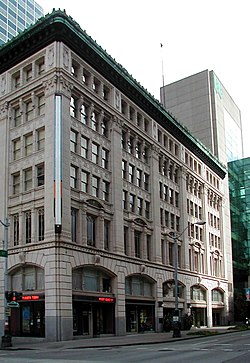Eagles Auditorium Building
Eagles Auditorium Building | |
 View of Eagles Auditorium from Union Street, September 2007. | |
| Location | 700 Union Street Seattle, Washington |
|---|---|
| Nearest city | Seattle, Washington |
| Coordinates | 47°36′39″N 122°19′56.7″W / 47.61083°N 122.332417°W |
| Built | 1924-25 |
| Architect | Henry Bittman |
| Architectural style | Renaissance Revival |
| NRHP reference No. | 83003338 |
| Significant dates | |
| Added to NRHP | July 14, 1983 |
| Designated SEATL | May 6, 1985[1] |
The Eagles Auditorium Building is a seven-story historic theatre and apartment building in Seattle, Washington. Located at 1416 Seventh Avenue, at the corner of Seventh and Union Street, the Eagles Auditorium building has been the home to ACT Theatre since 1996. It was listed on the National Register of Historic Places (NRHP) on July 14, 1983.[2] has two stages, a cabaret, and 44 residential apartments.[3] From the outset, the building was also in part an apartment building, originally under the name Senator Apartments: the four-story grand ballroom was surrounded on three sides by apartments.[4] with many of the apartment buildings located near streetcar lines.[5] The current configuration of the building, under the official name Kreielsheimer Place,[2] has two stages, a cabaret, and 44 residential apartments.[3]
The elaborately terracotta-covered building (designed by the Henry Bittman firm)[3] has been known at times in the past as the Eagles Temple and as the Senator Hotel.[6] The building was Aerie No. 1 of the Fraternal Order of Eagles (which was founded in Seattle).[2] It was one of several places where Martin Luther King, Jr. spoke November 10, 1961, on his only visit to Seattle.[3] The building also served as the home of the Unity Church of Truth from the mid-1950s until 1960, and was a major rock concert venue from the mid-1960s until 1970. Among other groups, such as Jethro Tull and The Doors, the Grateful Dead performed here eight times in 1967 and 1968.
Besides its NRHP listing, the building is also an officially designated city landmark, ID #112272.[7]

References
[edit]- ^ "Landmarks and Designation". City of Seattle. Archived from the original on 2013-03-06. Retrieved 2013-03-04.
- ^ a b c "Eagles Auditorium Building". National Park Service. Retrieved 2007-12-27.
- ^ a b c d The Eagles Auditorium: Where Dr. King made Seattle history, Remembering Dr. King, King County official site, October 31, 2002. Accessed 19 June 2013.
- ^ Diana E. James (2012). Shared Walls: Seattle Apartment Buildings, 1900—1939. McFarland. pp. 8–10. ISBN 9780786465965.
- ^ James, op. cit, p.96-98.
- ^ WASHINGTON - King County, National Register of Historic Places. Accessed 27 December 2007.
- ^ Landmarks Alphabetical Listing for E Archived 2011-07-21 at the Wayback Machine, Individual Landmarks, Department of Neighborhoods, City of Seattle. Accessed 28 December 2007.
- National Register of Historic Places in Seattle
- Fraternal Order of Eagles buildings
- Terracotta
- 1920s architecture in the United States
- Buildings and structures in Seattle
- Clubhouses on the National Register of Historic Places in Washington (state)
- Theatres on the National Register of Historic Places in Washington (state)
- Music venues in Washington (state)
- Residential buildings in Seattle
- 1925 establishments in Washington (state)
- Residential buildings completed in 1925
- Theatres completed in 1925
